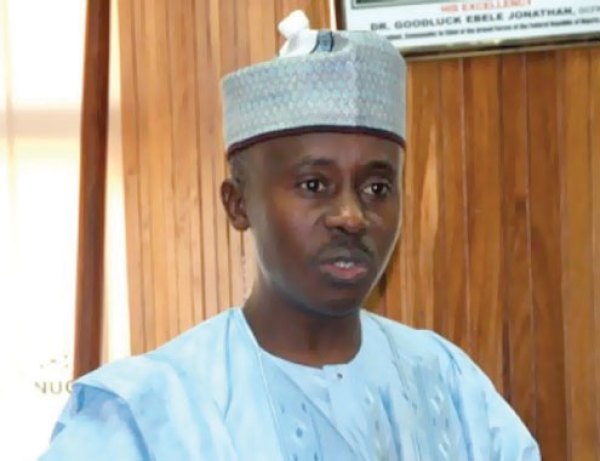The Farouk Lawan story
For those of us who came of political age in the first administration of this Fourth Republic, Farouk Lawan was an assurance of a better tomorrow. At 36 in 1999, the current age bracket of those overexcited teenagers who looked up to him then, he was elected into the House of Representatives. But his youth […]

Farouk Lawan
For those of us who came of political age in the first administration of this Fourth Republic, Farouk Lawan was an assurance of a better tomorrow. At 36 in 1999, the current age bracket of those overexcited teenagers who looked up to him then, he was elected into the House of Representatives. But his youth wasn’t his virtue because thirty-something-year-olds were also elected as Governors of Jigawa (Ibrahim Saminu Turaki), Zamfara (Ahmed Sani Yerima), Cross River (Donald Duke) and Abia (Orji Uzor Kalu). Lawan set himself apart for his daring and uncompromising dissents with the establishment, speaking out against them even when it’s not comfortable, and opposing their corruption in eloquent speeches.
Lawan also mobilized like-minded lawmakers to form what’s referred to as the “Integrity Group,” with himself called Mr. Integrity, to rebel against the excesses of his fellow political officeholders. When, in 2007, the group drew the nation’s attention to how the Speaker of the House of Reps, Patricia Eteh, unlawfully spent N620 million to upgrade her official residence and awarded contracts to her cronies, our faith in Lawan multiplied. But we were not surprised. He was all we had wanted; a genuine defender of our interests even in the darkest corners of politics.
When President Goodluck Jonathan woke up in the New Year of 2012 and decided to hike oil price, we found sympathy and solidarity from Lawan. He exposed the fraudulent schemes oil importers had deployed in stealing more than N2 trillion from Nigeria in the name of Oil subsidy, and wondering why the federal government hadn’t gone after masterminds of the heist. That revelation legitimized our rush to take to the street and challenge the government, and #OccupyNigeria was born. But this was the point his star began to dim.
As the courageous representative of Bagwai/Shanono Federal Constituency of Kano State tendered a 63-page report of the ad hoc committee he chaired, he asked the House to approve the acquittal of two oil marketers. The committee set up to investigate the oil subsidy scam, Lawan argued, had found out that Synopsis Enterprises Limited and Zenon Petroleum and Gas Limited were not complicit in the subsidy scam. The latter was owned by Lawan’s would-be nightmare, Femi Otedola. But that defence of Otedola’s oil company, unknown to Lawan’s colleagues and the public, was inspired by something other than the integrity for with which the lawmaker had been previously identified.
Since losing that public trust, along with his re-election three years later, obscurity set in for Lawan as he fought in one court after another to present a side of the story other than the familiar one—of him requesting a $3 million bribe to delist Otedola’s company as a beneficiary of the subsidy scam, of which $500,000 had been allegedly paid. But Ms. Angela Otaluka, the trial judge at the High Court of the Federal Capital Territory (FCT), Apo, stuck to Otedola’s side of the story last week and sentenced Lawan to seven years in jail.
Since the judgement, some commentators have embarked on expressing failed sympathy for that false prophet of our democracy. But the Farouk Lawan story we’ve followed since #OccupyNigeria days, when he let us down, doesn’t present Femi Otedola as an actual bribe-giver. So, the trending laments about the latter’s absence in Kuje, which occasionally betray the sympathizers’ ethnic, religious and familial affiliations, are misplaced. Mr. Integrity, as the Court acknowledged, was netted in through a sting operation backed by the DSS after being petitioned by Otedola.
No matter how Lawan intended to tell this story, he was caught on a tape. His false-hearted speech to have Otedola’s company acquitted has been unmasked as an attempt to mislead the country that once loved him, and that greed rubbished an investigation that ought to have brought perpetrators of the subsidy scam to book. It’s shocking that a man who had lasted for thirteen years in that criminally destructive role would yield to such temptation at the height of his national heroism, but then, as a friend teased, he probably needed the dollars to prepare for his rumoured gubernatorial bid in 2015.
If we are being honest about the Lawan story, it’s easy to grasp his downfall and it’s strange that a man that experienced underestimated the forces against him. He had powerful enemies then, including the Jonathan-led government he had antagonized fiercely, so an opportunity to document his hypocrisy was one that could’ve attracted instant endorsement from state agencies. The DSS responded kindly to Otedola, and made $500,000 available to unmask the man who’s scammed his way into the heart of Nigerians.
If Lawan wasn’t guilty of collecting $500,000, which was given in tranches of $250,000, he wouldn’t have been packing to spend some years in Kuje. Even if we seek to argue that the Jonathan-led government must’ve incentivized the judiciary then, the trial and sentence under the Buhari government could’ve been an opportunity to seek a neutral cover for a case that rotated among several courts and judges before it got to Ms. Otaluka.
The law may be an ass, sometimes, but Lawan is powerful enough to pull some strings to have his side of the story heard if he were indeed innocent. He would, regrettably, be remembered as just another fire-spitting advocate who, after a long run, became available for the highest bidder. This is just another Nigerian story; a betrayal of public trust.
